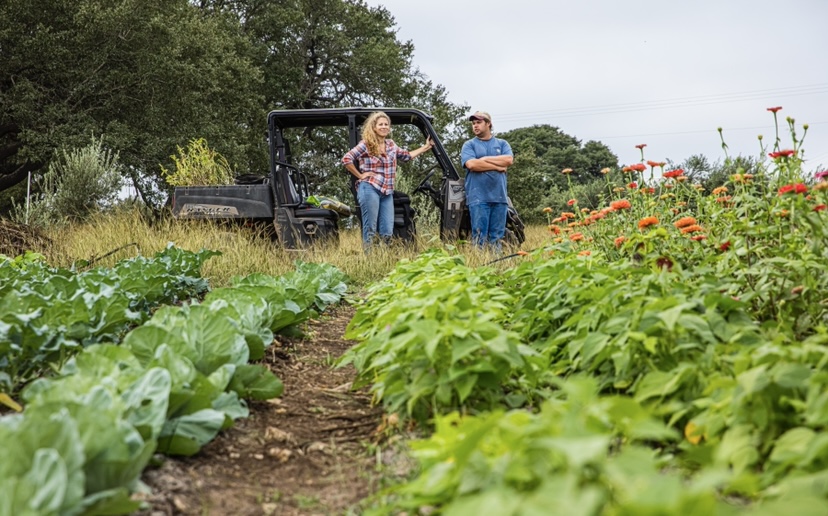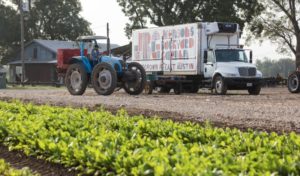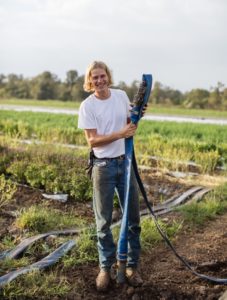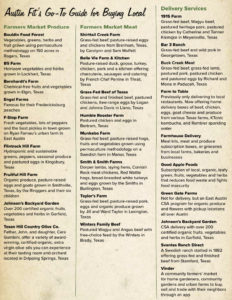Why You Should Buy from Local Farmers

While buying from the farmers’ market is a pleasant experience in itself, there is so much more to gain than just the ambiance of shopping outdoors. Here in ATX, The Texas Farmers’ Market hosts two events every weekend. TFM is at Lakeline on Saturdays from 9 a.m. to 1 p.m. and at Mueller on Sundays from 10 a.m. to 2 p.m. The events are a wholesome way to spend the weekend, moseying about the stands of vibrant fruits and vegetables during cool autumn mornings, listening to live music and conversing with local, small, family farmers.
The meat and produce at the market may have less in common with the offerings at your local grocery store than you would think. Texas farms like Bouldin Food Forest, B5 Farm, Fruitful Hill Farm and Flintrock Hill Farm implement farming practices in line with permaculture, a sustainable design in which farms work as an ecosystem, mimicking nature rather than fighting against it. The use of crop rotation, cover crops and grazing animals results in better water retention, less erosion, carbon-rich soil and an abundance of nutrient-dense, organic food that is more resilient than traditional soil-tilled, monocultures.
Monocultures like corn, wheat and soy require herbicides, fungicides and pesticides which can be so harmful that corn is actually genetically-modified to withstand it. According to regenerative farmer, Gabe Brown, the lack of crop rotation depletes the soil and crops of nutrients, resulting in the desertification of the land. When one of these monocrops fails, whether that be due to drought or bugs, taxpayers’ money is allocated toward federal crop insurance, subsidies and disaster relief. Between 1995 and 2020, this totaled $425 billion, according to the Environmental Working Group’s database. Supporting local farmers is a smart investment — financially, environmentally, medically and socially. It is giving back to the people who take care of our land and who feed us food that makes us healthier.
With Thanksgiving coming up, the timing could not be more appropriate to support our local farms. In Texas, Belle Vie Farm & Kitchen, a family-owned farm with French roots, and Smith & Smith Farms, a venture born from Colby Smith’s job loss, both raise pastured, broad-breasted turkeys available for purchase online, with pickup at the Lakeline and Mueller Farmers’ Markets. Other local farms offer grass-fed beef, pasture-raised pork, pasture-raised chicken and pasture-raised eggs, where the animals are free to graze on grass and forage for insects as they please. Some farms even offer delivery straight to your door.
1915 Farm
1915 Farm is a project started by Catherine and Tanner Klemcke just outside of Victoria, Texas. Catherine worked in pharmaceutical sales, and Tanner worked in oil until they both quit their jobs to pursue raising meat that prevented people from needing expensive pharmaceuticals. According to their website, the duo offers a subscription box called the “1915 Grassroots Club” with the option of delivery every 2-8 weeks and free shipping in Texas. It comes with various cuts of pastured heritage pork, pastured chicken and your choice of Wagyu or grass-finished beef.
Farmhouse Delivery
Farmhouse Delivery is a one-stop-shop for organic produce, pasture-raised meat, dairy, wild seafood, eggs and pantry items, all sourced from local farms and businesses. In addition to groceries, they offer subscription boxes of meat, produce and meal kits, delivered straight to any Austinites’ door.

A tractor rolls by, beginning a full day of farming at JBG Organic.
JBG Organic
The brainchild of UT Medical student, Zack Timmons, and Austin-native, Gabe Breternitz, Good Apple Foods is another produce-delivery service with the goal of reducing food waste in Austin. They deliver 10-13 pounds of produce from local farms that would otherwise go to waste. In addition, for every box ordered they donate a box to a family facing food insecurity.
Possibly the most well-known farm in Austin, Johnson’s Backyard Garden started in 2004 — literally in a backyard in East Austin. In 2010, the Backyard Garden expanded into a 168-acre plot in Garfield, Texas, and now offers a Community-Supported Agriculture (CSA) program to its customers which includes weekly or bi-weekly produce deliveries, invitations to garden or cooking classes, tours of the farm and potlucks. For those who want to be as involved in the process as possible, JBG offers a volunteer program in exchange for a share of produce. The program is currently suspended due to COVID-19, but you can check their website for updates.

All smiles at JBG Organic in Garfield, TX.
The number of local farms to choose from can be overwhelming. But whether you choose hydroponic tomatoes from Flintrock Hill Farm or the organic ones at your neighborhood grocery store, your dollar makes a difference in giving back to farmers who are doing the more unconventional thing by practicing sustainably.
Looking to get started? AFM has created a guide for buying local foods, so you know who is farming the food you eat, where they’re located, what they’re making and how to buy it, even if it’s just for Thanksgiving this year.
Austin Fit’s Go-To Guide for Buying Local

Farmers Market Produce
- Bouldin Food Forest
- Vegetables, greens, herbs and fruit grown using permaculture methodology on 150 acres in Rogers, Texas
- B5 Farm
- Heirloom vegetables and herbs grown in Lockhart, Texas
- Bernhardt’s Farm
- Chemical-free fruits and vegetables grown in Elgin, Texas
- Engel Farms
- Famous for their Fredericksburg peaches
- F-Stop Farm
- Fresh vegetables, lots of peppers and the best pickles in town grown on Ryan Farnau’s urban farm in East Austin
- Flintrock Hill Farm
- Hydroponic and sustainable greens, peppers, seasonal produce and pastured eggs in Kingsbury, Texas
- Fruitful Hill Farm
- Organic produce, pasture-raised eggs and goats grown in Smithville, Texas, by the Ringgers and their six children
- Johnson’s Backyard Garden
- Over 200 certified organic fruits, vegetables and herbs in Garfield, Texas
- Texan Hill Country Olive Co.
- Father, John, and daughter, Cara Gambini, offer a variety of award-winning, certified-organic, extra virgin olive oils you can experience at their tasting room and orchard located in Dripping Springs, Texas
Farmers Market Meat
- Shirttail Creek Farm
- Grass-fed beef, pasture-raised eggs and chickens from Brenham, Texas, by Carolynn and Sam Moffett
- Belle Vie Farm & Kitchen
- Pasture-raised duck, goose, turkey, chicken, pork and a kitchen offering charcuterie, sausages and catering by French Chef Perrine in Thrall, Texas
- Grass-Fed Beef of Texas
- Grass-fed and finished beef, pastured chickens, free-range eggs by Logan and Johnna Davis in Llano, Texas
- Humble Rooster Farm
- Pastured chicken and eggs in Bertram, Texas
- Munkebo Farm
- Grass-fed beef, pasture-raised hogs, fruits and vegetables grown using permaculture methodology on a Swedish farm in Manor, Texas
- Smith & Smith Farms
- Dorper lambs, laying hens, Cornish Rock meat chickens, Red Wattle hogs, broad-breasted white turkeys and eggs grown by the Smiths in Burlington, Texas
- Taylor’s Farm
- Grass-fed beef, pasture-raised pork, eggs and organic produce grown by Jill and Ward Taylor in Lexington, Texas
- Winters Family Beef
- Pastured Wagyu and Angus beef with free-choice feed by the Winters in Brady, Texas
Delivery Services
- 1915 Farm
- Grass-fed beef, Wagyu beef, pastured heritage pork, pastured chicken by Catherine and Tanner Klemcke in Meyersville, Texas
- Bar 3 Ranch
- Grass-fed beef and wild pork in Georgetown, Texas
- Buck Creek Meat
- Grass-fed beef, grass-fed lamb, pastured pork, pastured chicken and pastured eggs by Richard and Mona in Paducah, Texas
- Farm to Table
- Previously only delivering to local restaurants. Now offering home delivery boxes of beef, chicken, eggs, goat cheese and produce from various Texas farms, KTonic kombucha, and Rambler sparkling water
- Farmhouse Delivery
- Meal kits, meat and produce subscription boxes, or groceries from local farms, bakeries and businesses
- Good Apple Foods
- Subscription of local, organic, leafy green, fruits, vegetables and herbs that reduces food waste and fights food insecurity
- Green Gate Farms
- Not for delivery, but an East Austin CSA program for organic produce and flowers with pickup locations all over Austin
- Johnson’s Backyard Garden
- CSA delivery with over 200 certified organic fruits, vegetables and herbs in Garfield, Texas
- Svantes Ranch Direct
- A Swedish ranch started in 1882 offering grass-fed and finished beef from Stamford, Texas
- Vinder
- A community farmers’ market for home gardeners, community gardens and urban farms to buy, sell and trade with their neighbors through an app






